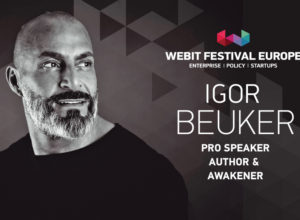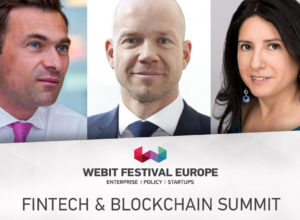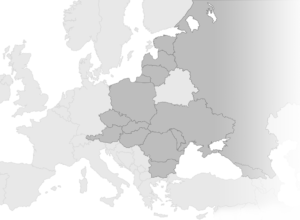Tag: Webit
Webit will reward the most innovative digital projects in Bulgaria and...
Webit will hand out its annual Awards during a glamorous black tie ceremony. Evening dresses and bow ties of nominees, guests and members of the jury are only one part of the experience during the official dinner. Even more important is the feeling that all the nominees and attendees are part of the people, who are creating the future right now!
The evening ceremony will be held on 25 April in Sofia Tech Park. It is part of the agenda of Webit.Festival Europe - the top digital technology and innovation event in Europe. Here you may see the full agenda of the event, and here you may book your ticket.
The Webit AWARDS recognize and promote quality business models, social projects and policy initiatives in the new digital and tech markets.
The awards are divided into several distinct areas. Winners will be announced for Bulgaria and Central and Eastern Europe - the region, which is the main focus of the event.
Enterprise Awards recognize the most innovative ways of using digital technology in Healthcare, Education, Transport, Tourism, Cyber Security, Enterprise Software, Marketing and Advertising, Cloud Service and Hosting, Increasing Accessibility and Inclusion and Connected Consumer Electronic Devices.
Digital Apps categories cover the best mobile solutions for Entertainment, Customer Service, Banking, Insurance and Finance Management, Games, News, Healthy Living and Eating and Sport News.
Webit’s Policy Awards will show the best smart city solutions for Mobility, Energy, Green Tech, Smart Administration, Innovation Through Legislation and Citizen Interaction.
The most successful woman in the tech sector, the most innovative secondary school and a person with outstanding contribution to the digital industry in Bulgaria will receive Special Awards.
Our Jury is composed of dozens of the top world experts in the fields of the awards, as well as local representatives of industry associations, scientists and directors of public institutions.
Among them are the Consultant Surgeon & Co-Founder of Virtual Medics & Medical Realities Prof. Shafi Ahmed, the Chief Creative Officer of DigitasLBi Chris Clarke, the CEO of Amyx+ Scott Amyx, the VP for Cloud and Mobile Technology Strategy at IBM Jonas Jacobi and Google’s Developer Advocate Don Dodge.
Here you may nominate your favourite for any of Webit AWARDS categories, and here you may book a seat or table for the official ceremony.
Igor Beuker will hit Webit’s stage to tell us how to...
Ever since the emergence of the homo sapiens species on this planet, human nature is directly related to constant processes of transformation and development. But in the modern society we live in, these changes are happening at a much faster pace than most of us can understand.
This year, Webit.Festival Europe will address precisely these comprehensive processes of the Fourth Industrial Revolution, which in the coming years will change almost every aspect of our lives fundamentally.
And there is hardly anyone, who understands today’s Digital world better than the renowned communicator and expert in Marketing and Media Igor Beuker. He will be among the keynote speakers during the Opening ceremony of the event, which will take place on 25-26 April in Sofia Tech Park.
In the space of 25 years, Igor Beuker was kicked out of professional football and went from a college dropout to a radical marketing visionary and modern-day serial entrepreneur. He has become one of the prominent speakers in the international business speaking circuit. And he hasn't slowed down since.
Today he is an energetic professional communicator, renowned keynote speaker & host, award-winning marketing strategist for Nike, Amazon, L’Oréal and Unilever, new breed trendwatcher for several Fortune 500 companies, serial entrepreneur with multiple exits, and angel investor.
Global enterprise leaders and media have labeled him one of the most inspiring, innovative and influential speakers and entrepreneurs. In the recent years he appeared on countless television and radio shows as an expert voice on emerging trends in marketing, media and innovation.
During his keynote speech at Webit.Festival, Igor will explain to the audience why he thinks that intelligence is the ability to adapt to change.
Igor will look at the trends through his Math Man lens and will share his thoughts on the world’s current systems, that were developed for the 20th century.
He will also present his views on the path Europe has to take to lead the digital economy and build collaborative ecosystems, instead of “egosystems”.
Watch Igor’s appearance on at CEEDS’15 by Webit:
Learn about the future of finance at Webit.Festival
World digitization process is causing massive changes in the payments industry in the recent years. And it’s not only Blockchain and its cryptocurrencies that are transforming the FinTech world, but a number of new startups that are finding new ways for moving money across the globe.
Enterprises have already realized that the key to success in the digital economy is the constant evolution, that can keep them competitive and relevant to customers.
A recent New Money survey showed that experts in this industry predict the end of cash money by 2020. More and more organizations stop accepting cash payments, while the number of customers managing their money digitally is rising rapidly.
At this year’s Webit.Festival Europe you can listen to some of the top experts in the world of finance and payments. During the FinTech & Blockchain Summit they will share their expectations about the development of money and finance worldwide and the role of technology in it.
The Global Head of FinTech at ING Group Benoit Legrand will speak about the process of digital transformation in general and the way his company is tackling the challenge of embedding innovation at its core for the last 20 years.
Novus Ordo Capital’s CEO Liliana Reasor will share her thoughts on the disruptive technology in the finance market, which accounts for $1.59 trillion in the US and the EU. She will explain how the FinTech ventures, driven by the digitization of the world, are forming the finance industry of the future.
Reasor is a thought leader in the FinTech and the finance industry and is active in several UK FinTech accelerators. She brings more than 18 years of experience in investment banking, lending, trading, investments, and FinTech from tier-one global financial institutions such as JP Morgan, Deutsche Bank, Banc of America Securities, Morgan Stanley, and Moody’s Analytics in the US and the UK. Due to her contribution to the FinTech & finance industry, she was selected as one of the Top 100 Global FinTech Women Influencers and Leaders in 2015.
TransferWise’s CEO and Co-Founder Kristo Kaarmann will share his thoughts on the time of change we live in and how technology will change the way we store money, move them between people and businesses and invest them.
The Executive VP for Global Product Strategy at Wirecard Christian Von Hammel-Bonten will talk about the future of payments from the point of view of a global leader in online payment technology for all sales channels.
Since 2011, von Hammel-Bonten has been responsible for building up Wirecard’s Mobile Payment division. In his function, he managed the launch of various mobile payment solutions and technologies and worked with telecommunication providers and banks.
The CEO of Eurogiro Michel Stuijt and the CEO and Co-Founder of Rewire Or Benoz will take part in a panel discussion about the future of payments. Stuijt is a veteran with over 25 years of experience in the financial service industry, the corporate banking business and the ICT sector. Benoz founded his company in 2015 and now Rewire offers a low cost banking solutions for internationals abroad and works with more than 10 000 clients in Israel alone.
Here you can see a full list of the confirmed speakers at Webit.Festival, while here you can get all the information you need about the tickets for the event.
New treatment methods puts curing breast cancer within our reach
Cancer is among the leading causes of morbidity and mortality with approximately 9 million annual deaths. About 70% of this lethal cases occur in low and middle income countries, while 25% of them are causing infections like hepatitis and human papilloma.
Last year Microsoft has vowed to solve the worldwide cancer problem within a decade. The tech giant plans to use ground-breaking computer science to break the code of tumor cells and reprogram them back into a healthy state.
But Microsoft’s army of biologists, software experts and engineers might have a tough competition for achieving this important goal because of several treatment breakthroughs in recent weeks.
On March 10 the European Cancer Organisation (ECCO) announced that approximately a quarter of women with HER2 positive breast cancer, who were treated with a combination of the targeted drugs lapatinib and trastuzumab before surgery and chemotherapy, saw their tumors shrink significantly or even disappear.
"This has ground-breaking potential because it allows us to identify a group of patients who, within 11 days, have had their tumours disappear with anti-HER2 therapy alone and who potentially may not require subsequent chemotherapy. This offers the opportunity to tailor treatment for each individual woman”, said Professor Nigel Bundred at the European Breast Cancer Conference just few days ago.Meanwhile, a new study by experts at the Wellcome Trust Sanger Institute suggests that new biological therapies can help fight breast cancers caused by rare, inherited genetic errors, like the one famous actress Angelina Jolie have. A newly discovered combination of targeted drugs could be effective in one in five breast cancer cases. One of the therapies is already used in the United Kingdom to treat advanced ovarian cancer cases, but it is still not approved as a breast cancer drug. The british scientists have found that a significant proportion of the genetic make-up of breast cancers have close similarities in their mutational signatures. This led them to the conclusion that they might be treatable with biological therapies. This along with other methods like regular exercising, eating a good diet, avoiding cigarettes, limiting alcohol usage and maintaining a healthy weight can lower women’s lifetime risks of breast cancer. To keep up with the hottest trends in the world of digital health Webit.Festival is the right place for you. During the Health & Wellbeing Summit, you can listen to top level speakers such as the Consultant surgeon & Co-founder of Virtual Medics and Medical Realities prof. Shafi Ahmed, the Deputy Chief Health Officer at IBM Lisa Latts and the Founder and CEO of Biovotion Dr. Andreas Caduff. Here you can see a full list of the confirmed speakers at Webit.Festival, while here you can get all the information you need about the tickets for the event.
re:Inventing Europe’s Future
A New Doctrine for intelligence specialization of CEE region empowering the future of Europe
The future of Europe is at stake, and the reasons extend far beyond obvious challenges such as the migration crisis and the political turbulence that led to Brexit. For the last 12 years, the European Union’s share of global GDP has fallen from nearly 32% to only about 23%. Although it is difficult to imagine the continent again becoming the center of global manufacturing, the EU still has the tools to reverse this trend. We can take advantage of the Fourth Industrial Revolution - a wave of digital-era change - and push the region to a period of sustained growth, through a combination of long-term policies, innovation and cooperation between governments and businesses. Central and Eastern Europe has the potential to play a very substantial role in the continent’s future. For the last five years, the region registered an impressive growth in Information Communication Technology (ICT) as a share of its GDP (in Bulgaria, for instance, it rose from 1.3% in 2012 to 3.3% in 2016). Instead of competing within the region’s smaller markets, we can create targeted intelligent specialization, drawing on existing areas of expertise as well as creating new new ones. This way one country’s industry will be able to expand into the broader European market, without having to compete within the region. Just a quick look at the Central and Eastern Europe’s investment market will show you that Poland has a very well developed start-up ecosystem in a number of sectors, but with substantial value concentrated in marketing automation. Тhere is already one unicorn (Allegro) and two more (SALESmanago and Growbots) on the way. Meanwhile, the video gaming industry boasts CD Projekt. These are two of the most promising verticals with established know-how and success in today’s Poland. Meanwhile, Czech Republic and Romania have become real pillars of European cyber security, with startups such as Avast Software, Bitdefender and TypingDNA, while my home country Bulgaria already has its own ICT success in the software development company Telerik, that was acquired by Progress Software for $262.5 million in 2014. In Slovakia, the advanced engineering company AeroMobil is developing the world’s first flying car and is expecting to start taking orders this year. Fostering further these areas of strength, supporting them with focused education and talents from within the region would make a huge difference for the region and further for the future of Europe. With a more in-depth study I am convinced that we can easily make a list of several specifications for each country and create strategies for regional development. The fourth industrial revolution and its new technologies are going to be the guiding light on our path to a better future. But industrial and economic innovation can’t be achieved without the needed legislation and government support. Just as Luxembourg has become the first country in the world with laws regulating the mining for resources in space, and Estonia was the first country that introduced electronic citizenship, we have to think about the right legislation to support the digital development of CEE. One possible example comes from Albania, where startups have the opportunity to launch with zero taxes until a certain amount of revenue has been established. We also need clear specialization from early the early school years to prepare our children for the needs of the future labour market. Nowadays very few people benefit from their knowledge of physics and chemistry. And teaching our children to code (as it is becoming mainstream currently) is the same as training them to drive a cab – it is a skill that will not help them find a job after the automation reaches its full potential. We need to rebuild our education systems so as to inspire critical thinking, creativity and teamwork, because this will be the skill that the future industry will demand the most. Achieving economic transformation of this magnitude will require not only legislative initiatives, but also state support in the form of subsidies and reduction of the administrative burden on the new businesses. The advanced technology startups in Europe are on the rise and now more than ever we need to support and invest in them, because this will be an investment in our common future. It can happen through new platforms for public-private partnership and targeted acceleration with government’s support. In many aspects the industry of Central and Eastern Europe is still stuck in the Soviet age. In recent years governments in the region talk more and more about the re-industrialisation of their countries. But instead of pouring money into new manufacturing capacity, states should support their brightest minds with more efficient programs for seed and next-round investments. About the author: Dr. Plamen Russev is serial entrepreneur, investors and philanthropist. He is the Executive Chairman of Webit.Foundation and the Global Webit Series - among the largest tech and digital events for EMEA, MENA, APAC and India. More info: www.russev.comCalifornia gives way to the self-driving future with new legislation
The last few decades shattered the myth that research and development of high technology is not possible without state support. But still in some cases the disruptive advances that are transforming whole industries can’t happen without disruptive legislation.
Last week California’s Department of Motor Vehicles announced that automakers and tech titans will be allowed to test their fully autonomous cars in the state. Many in the automotive industry thinks that although California is the go-to destination for development of self-driving technologies, the rules established right now are holding research back.
The new proposed regulations eliminates the need for human drivers in the car during the test drives. This means that the companies will no longer have to equip vehicles with steering wheels.
With the new set of rules, road testing of autonomous vehicles could begin by the end of the year, while the first real models could become available in the market in 2018.
According to the law professor at the University of South Carolina Brian Walker Smith California has taken a big step towards the development of a real self-driving car. While many define the new rules as industry-friendly, experts from the automotive sector are confident that they will make our experience on the road much safer than it is today.
Just for a week, the Self-Driving Coalition for Safer Streets doubled its membership. The alliance, founded in 2016 by Lyft, Uber, Ford, Volvo and Waymo now includes not just car manufacturers, but also organizations, that have a real stake in the implementation of this new kind of mobility. Among them are Mothers Against Drunk Driving, National Federation of the Blind, United Spinal Association, the R Street Institute and Mobility 4 All.
Yesterday, the Chinese manufacturer NIO showed its concept consumer autonomous vehicle - the NIO EVE. The company is backed by several venture capital firms from China and has hired experts from the biggest brands in the industry, such as Tesla, Lyft and Ford.
EVE is a look at NIO’s vision for the future of autonomous vehicles. The interior was the main focus for the designers. It offers various options for entertainment while riding and series of smart displays.
The company’s intention is to bring the car to the US market by 2020. It will have a range of more than 960 kilometers, and with just a ten minute charge you will be able to travel additional 320 kilometers.
To learn about the latest trends in the world of Mobility and Transportation, visit Webit.Festival Europe in Sofia on April 25th and 26th. During the Mobility Summit you can listen to top level lecturers like the Managing Partner at New Mobility Consulting Alexander Renz, the Oracle’s Digital Director for EMEA Luisella Giani, the Director of International Transportation and Government at Xerox Richard Harris, the Managing Director of Startupbootcamp Smart Transportation and Energy Tanja Kufner and the Director for Urban Development at Siemens Julie Alexander.
Blockchain technology gives patients real-time access to their personal data
The AI Health Tech subsidiary of Google, Deep Mind Health, is creating a system, based on the blockchain technology, to show how the company uses all the medical data that passes through its processors.
The “Verifiable Data Audit” will allow hospitals, doctors and even patients to track their personal information in real-time and see if it has been changed or compromised.
Deep Mind is trying to improve medical diagnosis with machine learning. But for developing those tools requires large amounts of confidential data.
The company was already criticized, after gaining access to patient records for 1.6 million people in three London hospitals. With its new project, Deep Mind will try to win back some of the lost trust.
“Data can be a powerful force for social progress, helping our most important institutions to improve how they serve their communities. As cities, hospitals and transport systems find new ways to understand what people need from them, they’re unearthing opportunities to change how they work today and identifying existing ideas for the future”, the company’s Co-founder Mustafa Suleyman wrote in a blog post.It is working in partnership with London’s Royal Free Hospital to develop kidney monitoring software called Streams, but critics still feel that data sharing can give Google too much power over the National Health System. According to Suleyman, data can only benefit society if it has society’s trust and confidence and that is the reason why auditability becomes an increasingly important virtue. He explained that any entry will record the fact that a particular piece of data has been used and also the reason why, for example a blood test was checked against the NHS national algorithm to detect possible acute kidney injury. The new systems are related to the bitcoin cryptocurrency and just like blockchain, the ledger will be append-only, so once a record of data use is added, it can’t be erased later. The ledger will also make it possible for third parties to verify that nobody has tampered with any of the entries. Meanwhile, Google announced a series of new tools to assist users with data preparation and integration, which will upgrade the power and agility of Google Cloud for business clients. The first released product is the new private beta of Google Cloud Dataprep. The tool is visualizing the data preparation, detecting anomalies and using machine learning to suggest data transformation that can improve the quality of information. To learn more about the latest trends in FinTech & Blockchain, Health Tech and Big Data & Cloud visit Webit.Festival Europe in Sofia on April 25 and 26. During the event you can listen to top level speakers, such as the Vice President for Cloud and Mobile Technology Strategy at IBM Jonas Jacobi, the Global Head of FinTech at ING Group Benoit Legrand and the Consultant Surgeon and Co-founder of Virtual Medics and Medical Realities Prof. Shafi Ahmed.
IBM stored information in an atom. What that means for BigData...
Reducing the size of computer components is a process that never stops surprising us over the past few decades.
But IBM managed to shock even the biggest tech enthusiasts, announcing that it has managed to read and write data into a single atom.
Although the achievement is still far from its practical application, it is a clear evidence that the concept of atomic data storage is more than accomplishable in the near future.
Today’s hard drives take about 100 000 atoms to store a single bit of data, but IBM’s experiment just showed us how much more we can work to improve the computing and storing processes we know now.
According to the company, when the technology of atom storage is fully developed, the entire Apple music catalog will be stored in a hard drive with the size of a coin.
Тhis has the potential to drastically change the way we see our computing devices. Few years ago we could not imagine that one phone can store hundreds of gigabytes of information, but now this is just one of many remarkable features of the top products on the market.
In the near future our wearable gadgets like smartwatches or rings could carry all our personal data. That kind of advance will be really big for the industry, that is expected to generate 17.6 trillion gigabytes of data by the end of 2017.
In order to store and analyze all that information, enterprises are going to have to increase their spending. IDC predicts that worldwide revenue for big data and business analytics will grew from nearly $122 billion in 2015 to more than $187 billion in 2019. That is a 50% increase over five years.
More than half of that spending will go to services providers, while companies will spend about $55 billion on big data software and $28 billion on hardware in 2019. Sectors like utilities, resource industries, healthcare and banking are likely to see their big data spending rise the fastest, while manufacturing will remain the biggest big data spender overall.
If you want to keep up with the hottest trends in the world of data usage and analytics Webit.Festival is the right place for you. During the Big Data & Cloud Summit, you can listen to top level speakers such as the VP for Cloud and Mobile Technology Strategy at IBM Jonas Jacobi and the CTO of Intel Security for EMEA region Raj Samani.
Here you can see a full list of the confirmed speakers at Webit.Festival, while here you can get all the information you need about the tickets for the event.
Confidential documents leak threatens consumer trust in smart devices
The huge development of digital technology over the past decade raised the topics of privacy and cyber security as paramount - for corporations and for individuals and even states.
And though many expected that the massive leak of information, like the ones that came from WikiLeaks and Edward Snowden, are provoked by political reasons and will be gone with the Obama administration, we now know that this is not the case.
Just yesterday Julian Asange’s website published the biggest ever leak of secret CIA documents. The confidential files contain details on the tools that American government uses to break into phones, communication apps and other electronic devices.
The leaked documents focus on the techniques for hacking and reveal how CIA worked with British intelligence services to find ways to compromise smart TV’s and turn them into devices for surveillance.
Asange’s revelations will only add to Samsung headaches. The company that was mired in negative headlines for months because of its exploding phones, the suspicion for spying through TV is not the best marketing tool.
According to WikiLeaks the secret program “Weeping Angel” used television’s microphones to pick up and transmit information while the device is switched off.
Meanwhile, Apple announced that the leaked vulnerabilities for its devices are already patched and CIA can’t control our iPhones remotely. Last year the company had a major dispute with the intelligence agency for hacking the phone of the terrorist that killed 14 people and injured 22 in San Bernardino, California.
According to Edward Snowden the leaked documents show, that the US Government is making software vulnerable on purpose by “developing vulnerabilities in US products and intentionally keeping the holes open”.
The famous whistleblower also noted that CIA is not hacking apps like Signal, Telegram and WhatsApp, but the whole iOS and Android operating systems. To learn more on the topic of cyber security and privacy, visit the Security & Privacy Summit within Webit.Festival. During 25th and 26th April 2017 in Sofia top level speakers from all over the world will share their experience in this important field. You can listen to experts like Ulrich Seldeslachts, CEO of LSEC-Leaders In Security, the CTO of Intel Security for EMEA Raj Samani and the Co-Founder of Distil Network Rami Essaid.PSA: This incorrectly implies CIA hacked these apps / encryption. But the docs show iOS/Android are what got hacked - a much bigger problem. https://t.co/Bw9AkBpOdt
— Edward Snowden (@Snowden) March 7, 2017








